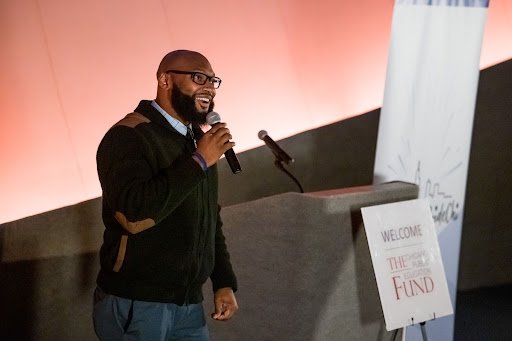An Interview with Dalonte Burns
Despite all the things that hold us back, alum Dalonte Burns believes we are enough.
Dalonte Burns (2013 Greater Chicago-NWI) is the principal at UIC College Prep. He is a first-generation college graduate, born and raised on the westside of Chicago, and graduated from Noble Street College Prep. He has committed his life’s work to education to serve his community in order to elevate and bring attention to the power of those most marginalized. He’s a firm believer in liberatory education being a key lever to multi-generational transformation.
In honor of Principal Appreciation Month, Dalonte was selected to speak at The Chicago Public Education Fund’s Principal Appreciation Happy Hour & Storytelling Event at The Museum of Science and Industry on October 21. At the event, Dalonte presented a compelling story to fellow school leaders and community members where he shared why he does the work he does. At that event, he shared a story about his commitment to the families, students, and educators he serves and said, “I made a commitment to myself that I will be enough so parents will believe that they are enough, so the students that I serve now as a principal will believe that they are enough, and so that this little Black boy from the West Side of Chicago will believe that he is enough. Despite the racism and white supremacy and trauma and oppression and all the things that hold us back, we can know that we were built for the very moment that we’re in and that we are enough.”
After this incredibly moving story, we spoke with him to learn about his motivations and inspirations.
What motivates you to work towards making an impact towards educational equity?
I believe that our educational institutions are (and have been for a very long time) colonized and perpetuate many of the oppressive policies and practices we see present in our society. Our schooling system is a space where our Black, Indigenous, and students of color (and staff) are forced to survive because of the White Supremacist, patriarchal, assimilationist, and anti-Black systems, structures, practices, and policies. It has not been a space that is affirming, safe, and equitable. I hope to disrupt this as a leader and educator so that schools are a space where students experience a sense of belonging where they are seen, loved, valued, affirmed
What has been the biggest learning as a new school leader?
What we’re working to actualize is a transformational process and we cannot allow urgency that centers Whiteness to disrupt the work. We must work to heal from the many impacts and manifestations of intergenerational trauma due to systemic and structural racism. We work to heal from the socialization into racist beliefs, policies, and practices for educating young Black, Indigenous, and people of color and that takes time.
We’re well into a dual-pandemic: COVID-19 and racial violence. How has the last year and a half changed the way you view your work, your mission, and the impact you want to make?
This past year has reaffirmed my “why” behind this work. Although it is the most challenging year I’ve ever experienced in education, I know that I am doing some of the most impactful work in our nation.
What advice would you give to community members who are seeking to grow their leadership and impact in education and the Greater-Chicago Northwest Indiana Community?
Our work as educators is embedded within systems of structural racism that manifests on an institutional, interpersonal, individual, and internalized level. We must work to lead and teach in ways that disrupts and dismantles, rather than reinforce the status quo. Our school needs to be a space that is about leading and teaching differently by modeling an experience that is an antidote to White Supremacy Culture.
Ten years from now, what is something you would want people to remember about your work in education, with students, and with the community?
I want people to remember that I was a transformational leader who worked with the school community to center the aspirations of our students and disrupt the systems and structures built to silence their genius and brilliance.

